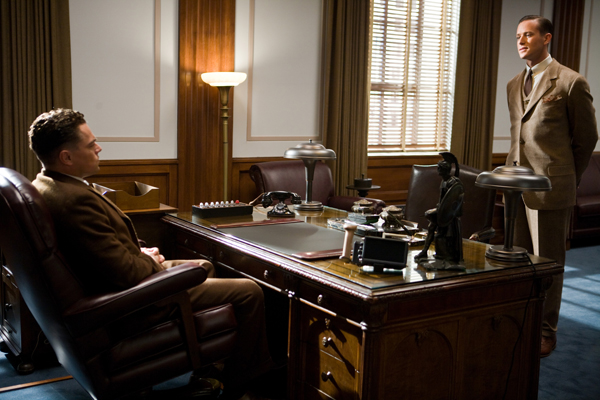A ho-hum review for a ho-hum biopic.
The H-Bomb: To call J. Edgar Hoover one of the most controversial figures of the 20th Century is almost an understatement. He is the man who more or less created the Federal Bureau of Investigation as we know it today, and ran it with an iron fist for nearly fifty years, right up until the time of his death. He was also considered a control freak who often abused his power to ruin the reputations, careers, and lives of many, many people. You would think that the life of such an individual would make for one dynamic biopic, but in the overly-understated hands of producer/director Clint Eastwood, you would be mistaken.
The film, told in non-linear fashion, basically covers the highlights of Hoover’s career; from his early days hunting and deporting anarchist radicals, to his introducing of scientific methods, such as fingerprinting, into criminal investigations, to his heading up the investigation of the Lindbergh baby kidnapping, to his attempt to bring down Martin Luther King. Along the way we get glimpses of his contentious relationship with Bobby Kennedy, his aversion to the opposite sex, his Norman Bates-like relationship with his mother, as well as his longtime “partnership” with his “confidant” Clyde Tolson.
Occasionally, we are treated to some interesting factoids, like how he came to be addressed as J. Edgar, and how he dreamed of an America where everyone’s information would be registered and available at a moments notice, in the name of stopping crime, but most of the speculative behind-the-scenes stuff seems to arrive at one single conclusion, that Hoover was insecure. He was insecure in the extreme, maybe because he was maybe gay, maybe because his demanding mother expected too much from him, who’s to say? Sadly, if you’re looking for any real insight into this most fascinating of historical figures, there is very little to be found. They go as far as to show him trying on his mother’s nightgown after she dies, but they don’t even touch on what might have been contained in his infamous secret files.
Aside from failing to give us a sense of who J. Edgar was, aside from what we could already surmise, Mr. Eastwood’s film also falls short as entertainment. Every would be dramatic event from his life, from an early bombing, to the Kennedy assassination, to pretty much everything else is treated in such a matter-of-fact way that they have little to no emotional impact whatsoever. Eastwood has always been on the low key side as a filmmaker, but here his approach is so leisurely, he keeps the whole film limping along at the same “so what” tempo, that he renders it all dramatically inert. Even the scene in which the skeleton of Lindbergh’s baby is found, which should be inherently upsetting, is ineffectual due to the indifferent storytelling.
That’s not to say that “J. Edgar” is without any virtues. The film certainly looks great, thanks to Tom Stern’s artfully shadowy cinematography and the handsome production design by James Murakami, which makes Hoover’s F.B.I. office, where the film spends a good portion of its 137 minutes, look appropriately closed off and claustrophobic. It conveys, far more effectively than the script does, how Hoover is involved with, yet weirdly disconnected to, many of the important events going on around him.
Solid production values aside, the film is also aided by the efforts of a game cast. The casting of Leonardo DiCaprio as Hoover may be questionable, but he puts in a commendable performance, nonetheless. He’s been bucking for an Oscar for a while now, and this is unlikely to win him one, but still, he shows here that he’s got what it takes to someday nab that little gold statue. His old man make-up is a little distracting, at first, but it’s not nearly as embarrassing as the layers of crap they piled onto Armie Hammer when he had to portray the elder, post-stroke Clyde Tolson. Good God, that was just a travesty.
As for Hammer’s performance, he’s terrific, actually, despite the laughable Mummy make-up. His Tolson is sympathetic as Hoover’s foil/maybe (most likely) lover, and I wouldn’t be at all surprised to see his name come up when the Oscar Nominations are announced. Naomi Watts fairs well as Hoover’s loyal, lifelong personal secretary, and actually manages to make a strong impression, despite not getting a whole lot, script-wise, to work with. As for Judi Dench, as the mother who would rather see her son dead than become a “daffy,” she’s good, in her typical scary, Judi Dench way. It’s just that Clint makes the mistake of showing her in close up, which makes the old age make-up on the other characters look all the more phony in comparison.
Though the actors all bring their A game, they are let down by Oscar winner Dustin Lance Black’s superficial screenplay, which shows us plenty of J. Edgar doing what J. Edgar did, but again, fails to show what made the man tick. He was an unhappy, insecure little man who wanted power and glory, who hated to dance as much as he hated the Reds. Okay… but why? “J. Edgar” is a bit of Oscar Bait that certainly has the look and feel of an important picture, but none of the substance.
It’s as if Eastwood was trying to play it safe with this one, as a character as rich as Hoover most definitely lived a more interesting life than the one depicted here. Perhaps a director with more teeth was needed to give this film the bite it needed. As it is, “J. Edgar” is toothless, flat, and just never nearly as captivating as it should be. It’s certainly not terrible, or even bad, but it’s not good, either. It’s a false start to the awards season, and most definitely worth skipping in theaters. I wouldn’t even recommend renting it. Honestly, this is one that can wait for cable.




